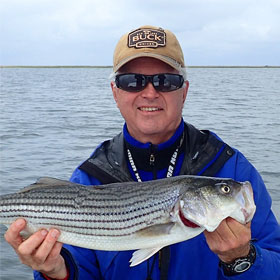Use Ice Fishing Flies and Jigs to Catch Winter Panfish
By Ken Schultz
Jan 14, 2021
Ice fishing for panfish sometimes requires using lightweight lures fished gingerly, and that’s where ice fishing flies and similarly small jigs shine
If you’re new to fishing on frozen lakes or ponds, you’ll quickly discover that most of the same considerations exist for this activity as for open-water fishing. This includes figuring out what species to fish for, where to concentrate effort, what to use, and how to make a presentation.
Ice Fishing vs Open Water Fishing
The big difference in ice fishing is reduced mobility and greater difficulty covering a lot of area.
Many ice anglers prefer to target panfish (especially bluegills, crappie, and yellow perch) because of their abundance and liberal catch limits. While you can use some form of bait to catch frozen-water panfish, a lot of anglers choose to jig vertically for these species using small artificial offerings such as ice fishing flies and jigs.
Ice Fishing Flies
Since there’s no fly casting or fly-rod use on the ice, you may be wondering about “flies” for ice fishing. Ice fishing flies are an example of the sometimes-confusing terminology adopted by the recreational angling community. Ice fishing flies are simply a form of light jig that is fashioned with material used on conventional flies, but with a weighted head. Whereas conventional jigs have a small soft-plastic body, or a body made with soft material like chenille, flies for ice fishing have fur or feathers or similar virtually weightless material on the hook shank behind a lightweight head. You might call them jig-flies and they’re just a tad light for casting with spinning tackle, a tad heavy for casting with fly tackle, but adequate for dropping vertically in the water column.(It’s worth noting, that conventional weightless, non-weighted-head flies can also be used in ice fishing, or in open-water fishing, as a dropper.)
Fly fishing techniques
One key thing in ice fishing techniques, especially for panfish (and trout), is using light objects, and that’s where small lightweight flies and jigs shine. Panfish don’t have large mouths, and while at times they can be aggressive, they often are not in cold winter water. Sink rate is therefore important at times. This is where presentation experimentation is necessary.
Successful ice fishing is not always about getting ice fishing flies or jigs down quickly to a certain depth. Sometimes it’s about getting them down slowly and somewhat unobtrusively, looking natural in the water, to keep from alarming the target species. And, once the lure is where you want it, that may also mean making a slight movement of your jigging rod rather than a quick upward jerk. Or just making a simple jiggle of the rod tip - you know, as you might do if your cold hand is shivering (wear a good glove).
Going ice fishing soon? Make sure you get your fishing license before you head out!









